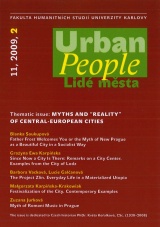Since Now a City Is There: Remarks on a City Center
Examples from the City of Lodz
DOI:
https://doi.org/10.14712/12128112.3656Klíčová slova:
city center, mythologization of a city center, culture areaAbstrakt
Every city has its center. The heart of a city and its center is usually a street or a square or both. In Lodz, one of the biggest cities in Poland, this role was played for a long time by Piotrkowska Street. This is the most famous Polish artery, which not long ago would be associated with the Lodz of labor and textile manufacturing, for the lot of Piotrkowska Street and the history of the city whose face and personality shaped the industry were intertwined. Today the street is an important element of the city; however, it does not determine the character of the city and has lost the function of concentrating public activities. Moreover, it is no longer recognized as the place where the most important events in public life take place (and that feature, according to Aleksander Wallis, characterizes a city center). Today, other spaces of Lodz have taken over the role of the city center and have brought together on their territory the cultural practices of the urban community. What is the cause for that state of things and where is the city center situated today? The article addresses these issues.
Stahování
Publikováno
Jak citovat
Číslo
Sekce
Licence

Tato práce je licencována pod Mezinárodní licencí Creative Commons Attribution-NonCommercial-NoDerivatives 4.0.


